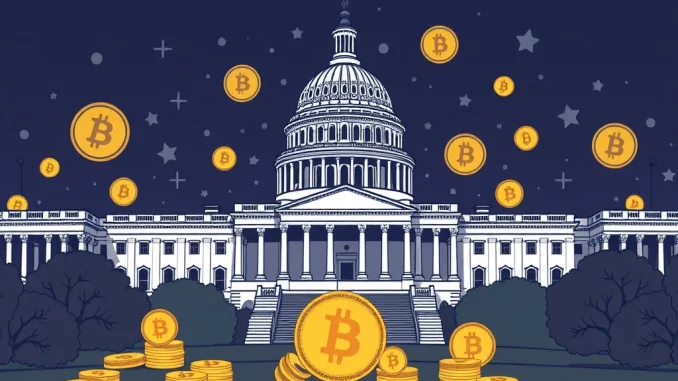
The landscape of stablecoin regulation in the United States is heating up. News from X reporter Eleanor Terrett indicates a key development: the U.S. Senate is set for a revote on the GENIUS Act, a significant piece of legislation aimed at regulating stablecoins. This upcoming vote, scheduled for May 19, follows the bill’s failure to advance just days earlier on May 9. Senator John Randolph Thune, a Republican, has refiled the bill with notable updates, signaling continued efforts to establish a clear regulatory framework for these digital assets.
Understanding the GENIUS Act and the US Senate Crypto Bill
The GENIUS Act represents a direct effort within the US Senate crypto bill discussions to bring stablecoins under specific regulatory oversight. Stablecoins, designed to maintain a stable value relative to a reference asset like the U.S. dollar, are seen by many as a bridge between traditional finance and the burgeoning crypto world. However, their potential for widespread adoption has also raised concerns among lawmakers regarding financial stability, consumer protection, and illicit use.
Senator Thune’s initiative reflects a broader push in Washington to address the regulatory status of various digital asset classes. While comprehensive crypto legislation has been slow to materialize, stablecoins have often been identified as a priority area due to their potential integration into payment systems.
Key Updates in the Revised Stablecoin Bill
The version of the stablecoin bill set for the May 19 revote includes revised provisions aimed at addressing some of the concerns or sticking points that may have led to its previous failure. According to reports, two key updates stand out:
- Naming Restrictions: The bill reportedly includes provisions that would ban the use of U.S.-related terms in the names of stablecoins. This could impact how stablecoins are branded and marketed, potentially aiming to prevent misleading associations or claims of official endorsement.
- Restrictions on Non-Financial Firms: A significant focus is placed on limiting the ability of non-financial public companies and major technology firms from issuing stablecoins. Companies explicitly mentioned in discussions include giants like Meta, Amazon, Google, and Microsoft. These firms would be restricted from issuing stablecoins unless they are able to meet stringent, specific requirements related to financial risk management and consumer protection.
These provisions highlight a legislative concern about the potential power and influence that large tech companies, with their vast user bases and resources, could wield if they were to issue their own stablecoins without adequate financial safeguards.
Why Crypto Regulation US Matters Now
The push for crypto regulation US is gaining momentum, and the GENIUS Act is a prime example. The outcome of this vote could have significant implications for:
- Stablecoin Issuers: They face new rules regarding operations, reserves, and potentially branding.
- Technology Companies: Firms like Meta and Amazon must evaluate whether meeting the strict requirements for stablecoin issuance is feasible or desirable.
- Consumers and Investors: Regulations aim to provide clearer protections, but the specific rules will determine the accessibility and nature of stablecoins available.
- The Broader Crypto Market: Regulatory clarity (or lack thereof) in a major market like the U.S. impacts innovation, investment, and global market dynamics.
The failure of the bill on May 9 suggests that there were significant disagreements or hurdles that needed addressing. The revised version indicates a compromise or an attempt to garner broader support by adjusting key provisions.
What’s Next for the GENIUS Act?
All eyes are now on May 19. The revote in the U.S. Senate will determine the immediate future of the GENIUS Act and its proposed framework for stablecoin regulation. The debate surrounding this bill underscores the ongoing challenge lawmakers face in balancing the potential benefits of stablecoins and blockchain technology with the need to mitigate risks and ensure financial stability.
Whether this revised US Senate crypto bill will succeed where the previous attempt failed remains to be seen. The outcome will be a key indicator of the legislative appetite for specific crypto regulation in the near term.
Conclusion: A Pivotal Moment for Stablecoins
The upcoming May 19 vote on the revised GENIUS Act is a pivotal moment for stablecoin regulation in the United States. Senator Thune’s refiled bill, with its updated restrictions on naming and tech firm involvement, reflects evolving concerns and legislative priorities. The passage of this stablecoin bill could set important precedents for how these digital assets are treated under crypto regulation US law, impacting everything from how stablecoins are named to which entities can issue them. The crypto community and traditional financial markets alike will be watching closely to see if the GENIUS Act can finally clear this legislative hurdle.



